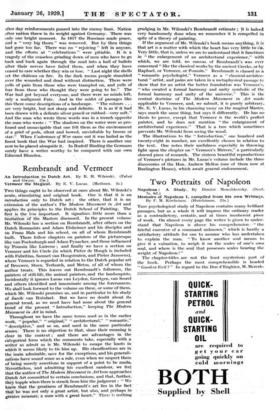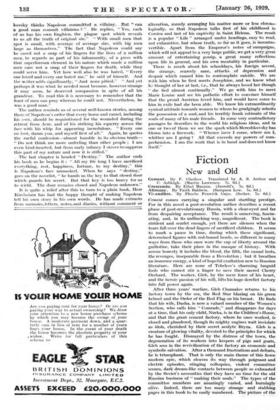Two Portraits of Napoleon
Tins pSychological study of Napoleon contains many brilliant passages, but as a whole it will impress the ordinary reader as a contradictory, ecstatic, and at times incoherent piece of work. On almost every page the writer is given to under- stand that Napoleon is above his comprehension—" the fateful executor of a command unknown," which is hardly a satisfactory attitude for one to assume who has undertaken to explain the man. " To know another soul means to give it a valuation, to weigh it on the scales of one's own soul, and where is the soul that possesses scales bearing the weight of Napoleon ! "
The chapter-titles are not the least mysterious part of the book. Perhaps the most comprehensible is headed " Good or Evil ? " In regard to the Duc d'Enghien, M..Merezh- koviky. - thinks Napoleon - committed a. villainy.. But " can a good man commit villainies ?." He replies, " Yes, each of us has his own Enghien, the plague spot which reveals to us all the truth of original sin." " With small men that spot is small, with average of average size, with big men large as themselves." The fact that Napoleon could say he cared not a snap of his fingers for the lives of a million men, he regards as part of his inhumanity, of a piece with that superhuman element in his nature which made a million men care not a snap of their fingers for death, while they Could serve him. Yet how well also he was hated, " Every one loved and every one hated me," he said of himself. And the writer adds significantly, " And none pitied." " And yet perhaps it was what he needed most because, however strange it may seem, he deserved compassion in spite of all his grandeur. To read this it is necessary to remember that the least of men can pray whereas he could not. Nevertheless, he was a good man."
The author reminds us of several well-known stories, among them of Napoleon's order that every horse and camel, including his own, should be requisitioned for the wounded during the retreat from Acre, and of his striking his equerry across the face with his whip for appearing incredulous. " Every one on foot, damn you, and myself first of all." Again, he quotes the rueful confession—almost humble in its obvious truth- " Do not think me more unfeeling than other people ; I am even kind-hearted, but from early infancy I strove to suppress this part of my nature and now it is stifled."
. The last chapter is headed " Destiny." The author ends his book as he begins it : " All my life long I have sacrificed everything, rest, happiness, fortune, to my destiny," this is Napoleon's face unmasked. When he says " destiny," goes on the novelist, " he hands us the key to that closed door which guards his secret. But that key is too heavy for us to wield. The door remains closed and Napoleon unknown."
• It is quite a relief after this to turn to a plain book, Herr Rircheisen has had the happy thought of making Napoleon tell his own story in his own words.. He has made extracts from memoirs, letters, notes, and diaries, without comment or alteration, merely arranging his matter more or less chrono- logically, so that Napoleon talks first of his childhood in Corsica and last of his captivity in Saint Helena. The result is a popular " Life " arranged under headings, easy to read, not exhaustive, but whose truth, so far as it goes, is incontro- vertible. Apart from the Emperor's notes of campaigns, which will not appeal to a very large public, we get a very great amount of entertaining gossip, a great many reflections upon life in general, and his own mentality in particular.
There is much about his schooldays, his foreign accent, the strange, scarcely sane, attacks of depression and despair whiCh Caused him to contemplate suicide. We are
with him when he first meets Josephine, and we know what he thought of her at last, i.e., that he always loved her though "• she lied almost continually." We go with him to meet Marie Louise and see his pathetic effort to convince himself that the proud Austrian loved him, and would have come to him in exile had she been able. We know his extraordinarily cynical attitude towards women to whom he grudgingly admits the possession of a soul, and his terribly frank estimate of the souls of many of his male friends. In some very contradictory passages he describes to the world his religious ideas, and in one or two of them we see the spark which Merezhkovsky has blown into a firework. " Whence have I come, where am I, whither am I going ? All that exceeds my powers of com- prehension. I am the work that is in hand and does not know itself."









































 Previous page
Previous page